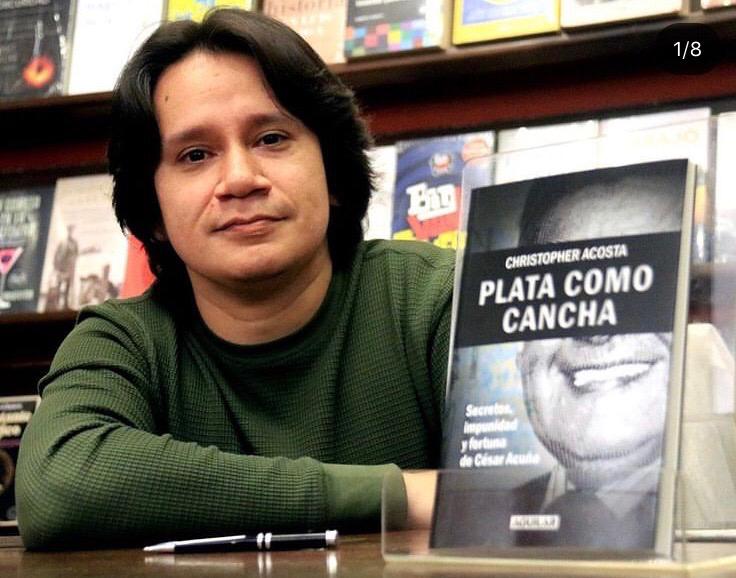Bogotá, January 13, 2022 – Peruvian authorities should not contest journalist Christopher Acosta and Penguin Random House Peru director Jerónimo Pimentel’s appeal of a recent criminal defamation conviction and should stop using criminal defamation laws against members of the press, the Committee to Protect Journalists said today.
On January 10, a criminal court judge in Lima, Peru’s capital, found Acosta and Pimentel guilty of defaming César Acuña, a former mayor, governor, congressman, and two-time presidential candidate; sentenced both to two-year suspended prison terms; and ordered Acosta, Pimentel, and Penguin Random House Peru to pay Acuña a total of 400,000 sols (US$102,608) in damages, according to multiple news reports and a copy of the sentence reviewed by CPJ.
Acuña filed his lawsuit in response to Acosta’s book “Money Like Popcorn: Secrets, Impunity, and the Fortune of César Acuña,” which was published in February 2021 by Penguin Random House Peru. In the book, numerous named sources allege that Acuña engaged in vote-buying, misappropriation of public funds, and plagiarism, Acosta told CPJ via messaging app.
However, Acuña has never been convicted of the crimes and in his 49-page decision, Judge Raúl Jesús Vega found that 35 quotes in the book damaged Acuña’s honor and reputation.
CPJ sent voice messages seeking comment to Acuña’s lawyer Enrique Ghersi and to his spokesman and son, Richard Acuña, but they did not respond.
“We are outraged by a Peruvian court’s decision to convict Christopher Acosta and Jerónimo Pimentel on defamation charges for Acosta’s book about politician César Acuña,” said CPJ Latin America and Caribbean program coordinator Natalie Southwick, in New York. “This absurd conviction is the latest egregious example of how criminal defamation laws and the Peruvian justice system are consistently used to stifle reporting on stories in the public interest.”
Acosta is investigations editor at the private Lima TV station Latina Noticias and is a highly respected journalist in Peru. He told CPJ that all the book’s allegations against Acuña are contained in direct quotes from people he interviewed, news stories in the Peruvian media, investigations carried out by the Attorney General’s office, and testimony from lawsuits and congressional hearings.
He called the guilty verdict “absurd” and said that unless reversed on appeal, the ruling would set a dangerous legal precedent of putting the responsibility on journalists to prove allegations made by their sources. In addition, he said it made no sense to include Pimentel in the lawsuit because, although he heads the Peru division of Penguin Random House, he had no role in editing the book.
Acosta said his defense lawyer Roberto Pereira would file an appeal within a few days. If the three judges on the appeals court uphold the guilty verdict, he said Pereira will ask Peru’s Supreme Court to rule on the case. Pimentel told CPJ via messaging app that he will also appeal the guilty verdict.
Press freedom and human rights groups, publishers associations, and numerous Peruvian media outlets strongly rejected the ruling while the United Nations, the European Union, and the U.S. Embassy in Peru responded with statements declaring press freedom fundamental for democracy.
Acuña, who finished seventh in Peru’s presidential election last year, applauded the verdict. “This is my chance to show that I am innocent,” he told the Peruvian TV station Willax. “I’m not against press freedom but I am against defamation.”
